
“Am I The Jerk For Telling My Daughter-In-Law She Wasn’t Invited Due To Her Weight?”
Good communication can help solve a lot of issues down the line. However, it doesn’t mean that everyone’s a fan of honesty—the truth can sting, even if it’s nuanced and comes from a family member. When it comes to topics like people’s weight and health, the discussion can get heated very quickly.
Reddit user u/Mysterious_Prior7438 turned to the AITA online community with a very sensitive family issue. She explained that she no longer invites her obese daughter-in-law on family trips due to her constant complaining about walking and the amount of time she spends sitting. You’ll find the full story, as well as what the internet had to say about the situation, below.
Keep in mind that before you make any drastic lifestyle changes, it’s important that you talk to your doctor about your health goals, possible diet changes, and exercise plan.
If a person is unfit, they’ll have a hard time on family outings that require a lot of moving about
Image credits: Andres Ayrton (not the actual photo)
One woman shared what finally made her snap at her daughter-in-law, who is obese and prone to complaining
Image credits: YuriArcursPeopleimages (not the actual photo)
Image credits: Mysterious_Prior7438
Obesity is incredibly widespread in the United States and increases the risk of diseases
A person’s size or weight is far from the only indication of their health and being mean to someone because of their size is unacceptable. However, let’s not beat around the bush—excess weight is extremely dangerous to a person’s health.
To put it bluntly, being overweight drastically reduces your quality of life and puts you at risk of a wide range of diseases. It can also reduce the quality of your relationships if your family and friends lead more active lifestyles that you physically can’t participate in.
In the US, 42.4% of adults had obesity in 2017 and 2018, according to the data from the National Health and Nutrition Examination Survey. 9.2% of all American adults also had severe obesity.
The CDC warns that obesity increases the risk of heart disease, stroke, type 2 diabetes, and certain types of cancer. These premature deaths are preventable. The obesity epidemic isn’t just a health disaster, it also puts a lot of financial pressure on the system. In 2019, the annual medical cost of obesity in the US was nearly $173 billion.
Image credits: Andres Ayrton (not the actual photo)
Deciding to live a healthier life is very personal and the shift in mindset has to come from within
Broadly speaking, there are two main approaches here. On the one hand, the overweight person can convince their family to invite them and to be patient when they can’t keep up. On the other hand, if their main goal is to be included in wholesome family outings, they may want to consider losing weight so they can participate to the fullest.
In the first scenario, you’d essentially be forcing everyone else to adapt to your pace and stop having fun while they wait around for you to catch your breath. That’s not really fair to the people you go on the trip with. At some point, being kind and polite no longer works and you start doing what you love without others holding you back.
Meanwhile, the second scenario is infinitely more difficult and requires a more strategic, mature approach to the issue. It means recognizing that you may not be the most important person in other people’s lives. And as such, they’re not obligated to invite you anywhere. Especially if they feel that they constantly have to put their own goals on hold to cater to yours.
The overweight person would then speak to their healthcare specialists and come up with a way to improve their health, drop some weight, and increase their stamina. If they’re able to keep up with everyone else during the family trips, then the issue is solved.
Of course, it’s worth being diplomatic when tackling the issue of someone’s weight and how it’s affecting not just them, but their loved ones. Ideally, you want the person to understand that they have your full support, but that they need to commit to making some fundamental changes to their lifestyle.
Image credits: Andres Ayrton (not the actual photo)
Changing your lifestyle means committing to making small changes over a very long period of time
Let’s be real here, losing a lot of weight quickly is unhealthy. It needs to happen over a long period of time. But what’s essential here isn’t just the end goal. It’s committing to a very different way of living that incorporates exercise, proper sleep, choosing nutritious food over processed products, and avoiding unhealthy habits like smoking and drinking alcohol. It’s something that should become a part of your life, not a temporary measure for a few months.
You should aim to make tiny, gradual changes instead of altering everything at once. That might mean starting to go for short walks after meals that might eventually turn into longer hikes after a few months. Immediately changing all of your eating habits is also likely to make you miserable, so it’s best to make small shifts. Like choosing not to eat one snack a day. Or drinking more water instead of soda. Or eating more veggies instead of junk food for one meal.
You don’t have to walk the recommended 10k steps per day right off the bat. You can set your standards lower and slowly increase them. What matters is moving even just a little bit more. As The Guardian reported recently, walking just 4k steps a day can cut the risk of dying from any cause, based on research from the Medical University of Lodz. Walking more was said to reduce this risk by 15% for every additional 1k steps.
Image credits: alleksana (not the actual photo)
Many readers thought that the mother-in-law wasn’t to blame for what happened
Some readers, however, thought that there were better ways to handle the situation
At such a young age to be so physically limited, sounds like there may be more going on than just her size and attitude? I'd suggest a very thorough physical to rule out serious disease.
I would second that. Ankle swelling and limited mobility at such a young age sounds like she could have significant health issues that contributing to the weight.. She might be retaining a lot of water due to cardiac distress.. Problems like that can creep up on you and can be addressed if you know what the problem is.
Load More Replies...Definitely an attitude issue not a weight issue - although the way the MIL talks about the weight is pretty gross. I'm overweight but reasonably fit, I've a friend who the same size as me and not very fit so doing anything that involves walking a long distance is going to be a complaint festival, so we just don't do those things. When we catch up we do less active things. Simple.
So nobody can go to the pumpkin patch because she's not fit enough to do it too? I totally understand your reasoning, but the other people should still be able to do what they want to do even if chubby girl can't, and maybe do something else at another time where they don't intend to walk anywhere with her. However, girl has to understand that too.
Load More Replies...As a former obese person-I never expected people to cater to me. DIL shouldn’t be so entitled to expect others to bow to her complaints
As a person with some disabilities, I am with you, if I need a break - go on without me. I will either catch up with you, or meet up with you later.
Load More Replies...At such a young age to be so physically limited, sounds like there may be more going on than just her size and attitude? I'd suggest a very thorough physical to rule out serious disease.
I would second that. Ankle swelling and limited mobility at such a young age sounds like she could have significant health issues that contributing to the weight.. She might be retaining a lot of water due to cardiac distress.. Problems like that can creep up on you and can be addressed if you know what the problem is.
Load More Replies...Definitely an attitude issue not a weight issue - although the way the MIL talks about the weight is pretty gross. I'm overweight but reasonably fit, I've a friend who the same size as me and not very fit so doing anything that involves walking a long distance is going to be a complaint festival, so we just don't do those things. When we catch up we do less active things. Simple.
So nobody can go to the pumpkin patch because she's not fit enough to do it too? I totally understand your reasoning, but the other people should still be able to do what they want to do even if chubby girl can't, and maybe do something else at another time where they don't intend to walk anywhere with her. However, girl has to understand that too.
Load More Replies...As a former obese person-I never expected people to cater to me. DIL shouldn’t be so entitled to expect others to bow to her complaints
As a person with some disabilities, I am with you, if I need a break - go on without me. I will either catch up with you, or meet up with you later.
Load More Replies...
 Dark Mode
Dark Mode 

 No fees, cancel anytime
No fees, cancel anytime 




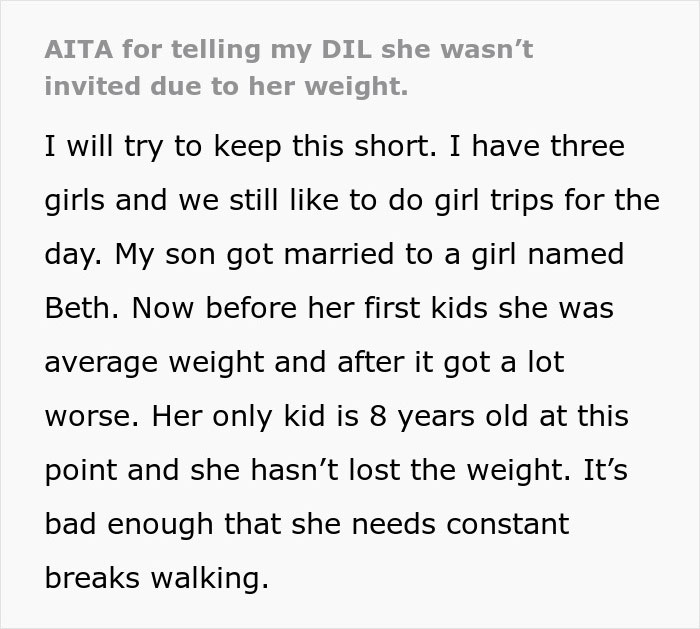


















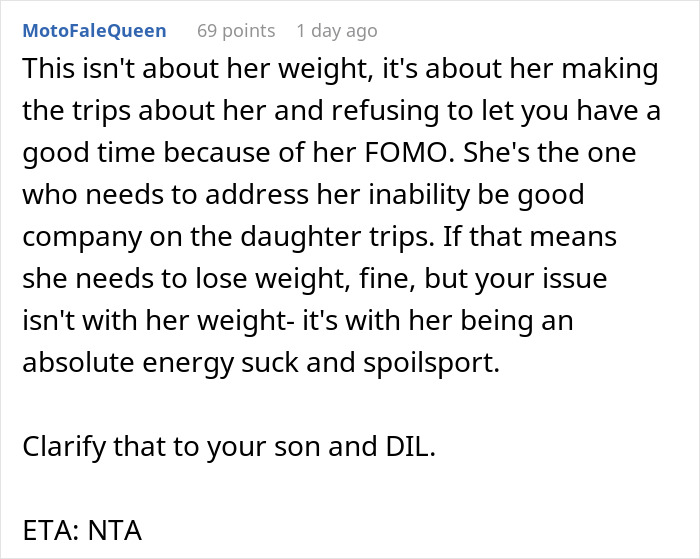




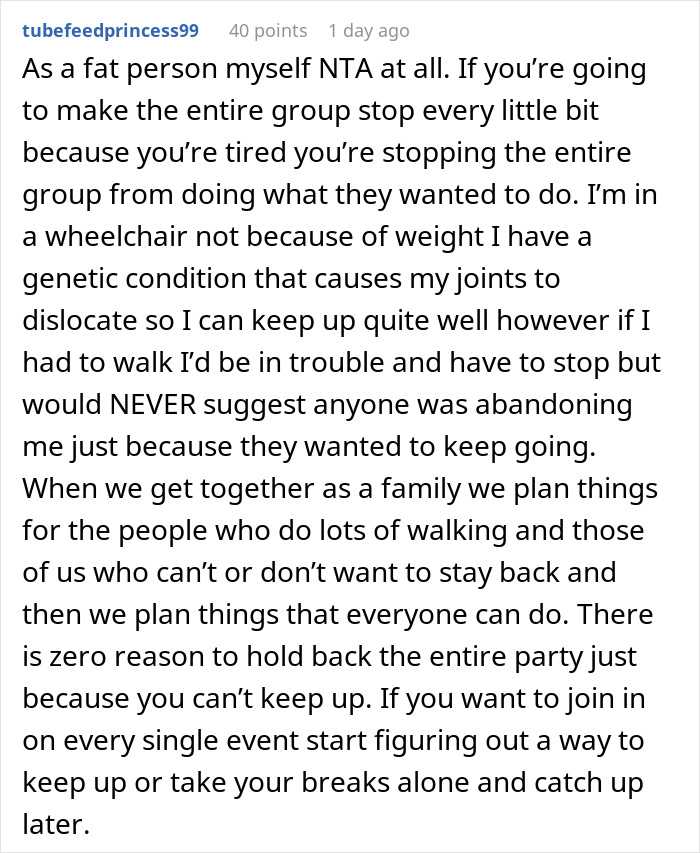






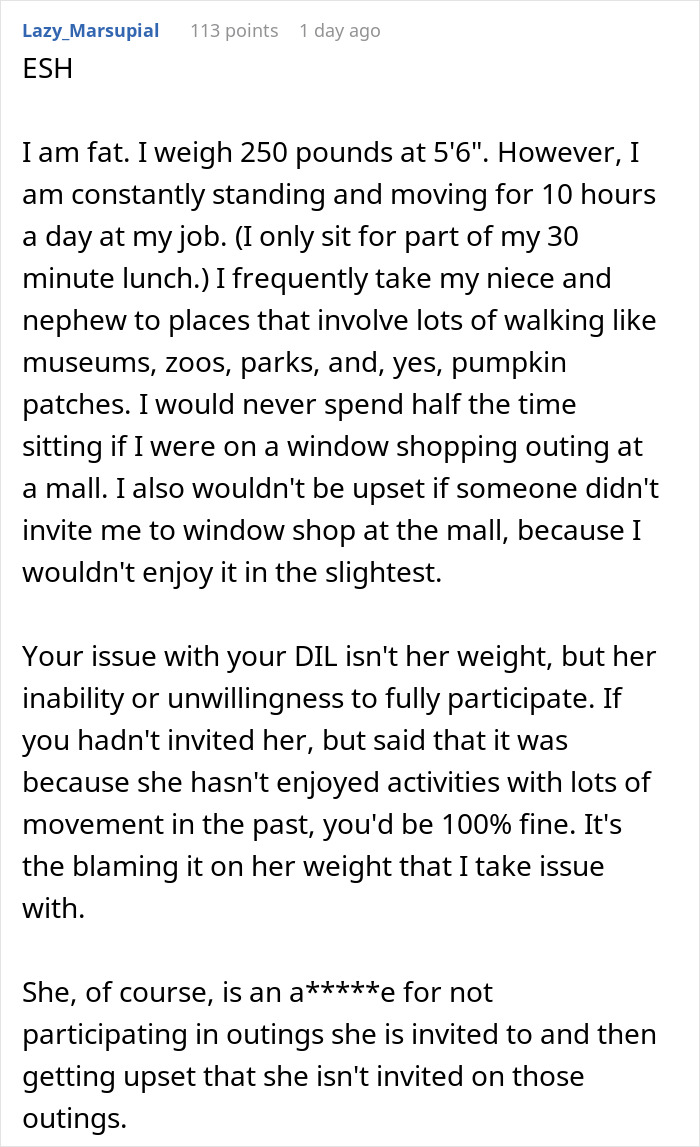
































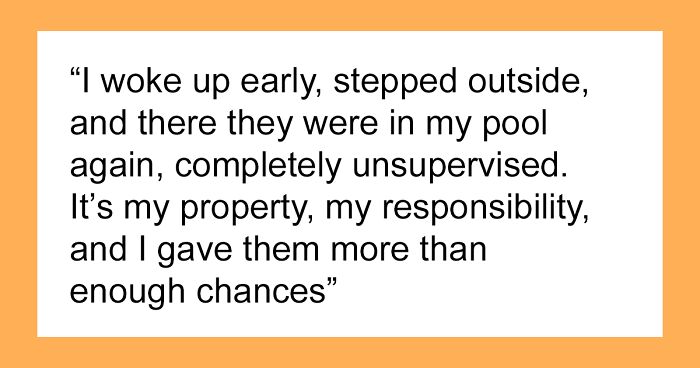












70
151